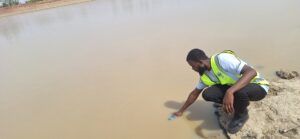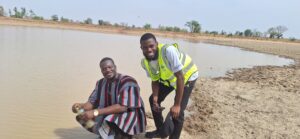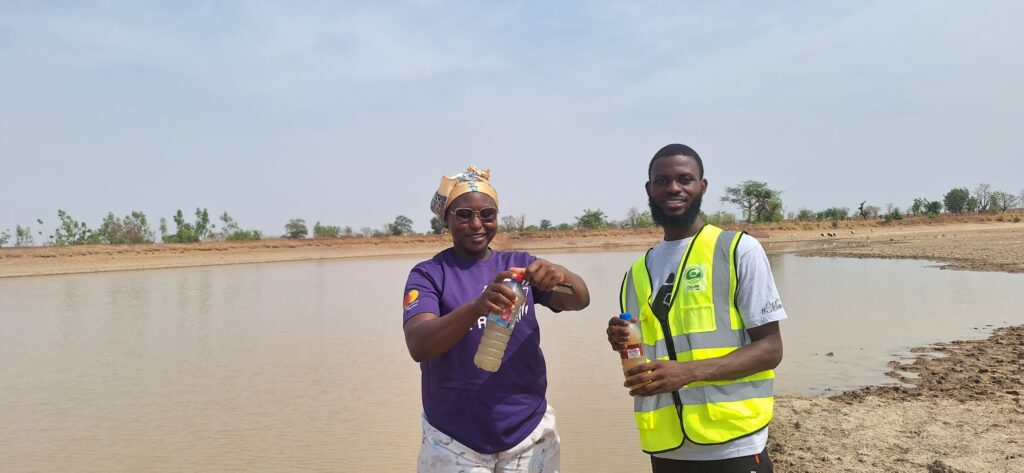As we approach World Water Day on March 22nd, it’s crucial to reflect on the state of our water bodies in Ghana, many of which are under serious threat due to harmful human activities. Over the years, mining, open defecation, industrial pollutants and poor waste management have wreaked havoc on our rivers, lakes, and streams. These invaluable water sources are not just vital for drinking but are also central to agriculture, sanitation, and the livelihoods of countless communities.

Ghana’s Climate Crisis is a Water Crisis
For decades, Ghana has grappled with the consequences of illegal mining activities (also known as “Galamsey”, which have led to the destruction of aquatic ecosystems and contamination of water sources with mercury and cyanide. Our rivers, including the Tano, Pra, and Offin rivers, have borne the brunt of these activities, which not only pollute the water but also render it unsafe for consumption, agriculture, and even recreational use.
Open defecation remains a pervasive issue, particularly in rural and underserved areas, where sanitation facilities are limited. Without proper waste disposal systems, human waste often ends up in nearby water bodies, further compounding the contamination problem. Additionally, industrial waste and plastic pollution continue to choke our rivers and seas, with dire implications for public health and environmental sustainability.

Our Commitment to Change: WASH Interventions in Action
At the Center for Opportunities and Rural Development (CORD), we are committed to restoring the health of our water bodies and improving the quality of life for the Ghanaian rural communities. In light of these challenges, we have designed a multifaceted approach to address the water crisis in Ghana’s Northern belt (Savanna, Upper East, Upper West, North East, and Northern), and promote sustainable Water, Sanitation, and Hygiene (WASH) practices:
✅ Xylem Filter Intervention: Improving Access to Safe Drinking Water
We recognize that access to clean, safe drinking water is a fundamental human right. Through our Xylem Filter Intervention, we are providing communities with affordable and sustainable filtration technology that purifies contaminated water from rivers and wells. These filters are designed to remove harmful bacteria such as shigella, vibrio cholerae, salmonella, e-coli, etc. with a 3 – log reduction efficiency, making water safe for drinking and other domestic uses.
✅ Community and School Advocacy & Education on WASH
Our efforts extend to community-based education and advocacy on the importance of Water, Sanitation, and Hygiene (WASH) practices. We are currently conducting workshops and awareness campaigns in schools and communities to instill hygiene habits, proper waste disposal methods, and safe water usage. Through these educational initiatives, we are equipping future generations with the knowledge they need to safeguard water sources and maintain healthy sanitation practices. We have also provided over one thousand(1000) hand washing facilities and trained over Five Hundred (500) household on the construction of disability friendly washing facilities.
✅ Precision Advertisement to Enhance Sustainability
With the growing need to track the progress and impact of our interventions, we are using precision advertisement technology to promote responsible water use, monitor access to safe water, and raise awareness of water conservation efforts. Through targeted outreach, we can directly engage local communities and key stakeholders, ensuring that messages on water sustainability are both timely and effective.
✅ Involving Community Authorities for Policy Development
To ensure the long-term success of our initiatives, we are working hand-in-hand with local authorities, traditional leaders, and policy makers to develop and implement regulations and policies that guide the safe and responsible use of water resources. This includes enacting local regulations to curb further pollution of water bodies and promoting better practices in waste management, agriculture, and mining activities.
✅ Supporting the Restoration of Water Ecosystems
Beyond filtration and advocacy, we are actively involved in restoring and protecting water ecosystems. This involves partnering with environmental groups and stakeholders to replant mangroves, protect riverbanks from erosion, and promote sustainable farming practices that minimize the use of harmful chemicals. By focusing on ecosystem restoration, we hope to not only improve water quality but also strengthen the resilience of our communities to climate change and environmental degradation.
✅ Promoting Community-Led Water Governance
Our approach is grounded in the belief that the community must play an active role in managing its water resources. Through community-led water governance models, we are empowering local groups to take charge of the management, protection, and sustainable use of water resources. This ensures that water access is equitable, inclusive, and aligned with the specific needs and challenges of each community. CORD Ghana trained Water and Sanitation Management committees in 68 rural communities on water governance, maintenance of water facilities and protection of healthy environment.
Together, We Can Protect Our Water Bodies
The challenges facing Ghana’s water bodies are immense, but so is the power of community action and innovation. As we approach World Water Day, we call on all Ghanaians — from individuals to local governments, NGOs, and businesses—to join us in addressing the growing water crisis.
At CORD Ghana, we are committed to not only addressing the symptoms of water pollution but also tackling the root causes, ensuring a cleaner, healthier, and more sustainable future for all. Let’s work together to preserve and protect our water bodies for future generations.



It’s a good initiative which will help to protect our water bodies in the rural communities and schools in Ghana.#CORD Ghana thanks for taking these tasks to help sustain people wellbeing.